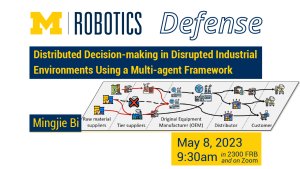Presented By: Michigan Robotics
Distributed Decision-making in Disrupted Industrial Environments Using a Multi-agent Framework
PhD Defense, Mingjie Bi

The modern industrial environment is becoming more complex and dynamic, due to customized and shifting market demands, highly connected businesses, and frequently upgraded technologies. In such environments, varying uncertainties and disruptions could occur and highly impact the performance of the manufacturing factories and supply chain networks. Conventional centralized decision-making approaches handle disruptions by re-optimizing across the entire system regardless of disruption type and scale, which require significant computational efforts, especially for complex and large-scale systems. Therefore, to stay competitive, industry enterprises need to develop a dynamic and flexible decision-making method that enables an agile and resilient response to these unexpected disruptions in industrial environments.
Enabled by current Artificial Intelligence (AI) techniques, multi-agent control has been proposed to conduct distributed decision-making to provide an agile response to disruptions. A multi-agent system consists of various autonomous agents, which are cyber representations of their associated physical objects and have their own knowledge and goals. Agents communicate and interact with each other to make high-level decisions for their associated physical objects. In different industrial environments, agents could represent different system entities, such as the products and machines in manufacturing systems, or suppliers and customers in supply chains. However, most existing industrial multi-agent systems require prior knowledge of disruptions and predetermined rules and strategies to generate responses, which makes it difficult to handle unexpected disruptions.
Aiming to improve the agility and resiliency of industrial systems, this dissertation develops a model-based multi-agent framework to address risk management within an agile and resilient response to various unexpected industrial disruptions. The proposed multi-agent framework comprises model-based agents, heuristic-based communication, and optimization-based decision-making. The model-based agent architecture enables agents to update their knowledge and local environments dynamically. When agents need to make decisions, they utilize their knowledge as heuristics to instruct their communication strategies. Then based on their knowledge and communication information, agents can identify new actions by solving risk-aware optimizations to respond to unexpected disruptions dynamically. The proposed framework is tested in a simulated manufacturing environment and a supply chain instance, showcasing the improved flexibility, agility, and resiliency of the industrial systems.
To conclude, this dissertation pushes the fields of distributed decision-making for industrial systems closer to satisfying the requirements of modern industry: flexibility, agility, and resiliency, especially for manufacturing systems and supply chain networks. Enterprises could apply this framework to compute a resilient recovery plan to address a disruption quickly to minimize the negative effects. In addition, this dissertation contributes to standardizing the design of system-level decision-making using a multi-agent framework. The proposed methodology to design a multi-agent framework is transferable to other complex systems, such as multi-robot systems and autonomous vehicle teams, that consist of multiple intelligent entities.
Zoom: https://umich.zoom.us/j/94248906200, Passcode: mingjie
Enabled by current Artificial Intelligence (AI) techniques, multi-agent control has been proposed to conduct distributed decision-making to provide an agile response to disruptions. A multi-agent system consists of various autonomous agents, which are cyber representations of their associated physical objects and have their own knowledge and goals. Agents communicate and interact with each other to make high-level decisions for their associated physical objects. In different industrial environments, agents could represent different system entities, such as the products and machines in manufacturing systems, or suppliers and customers in supply chains. However, most existing industrial multi-agent systems require prior knowledge of disruptions and predetermined rules and strategies to generate responses, which makes it difficult to handle unexpected disruptions.
Aiming to improve the agility and resiliency of industrial systems, this dissertation develops a model-based multi-agent framework to address risk management within an agile and resilient response to various unexpected industrial disruptions. The proposed multi-agent framework comprises model-based agents, heuristic-based communication, and optimization-based decision-making. The model-based agent architecture enables agents to update their knowledge and local environments dynamically. When agents need to make decisions, they utilize their knowledge as heuristics to instruct their communication strategies. Then based on their knowledge and communication information, agents can identify new actions by solving risk-aware optimizations to respond to unexpected disruptions dynamically. The proposed framework is tested in a simulated manufacturing environment and a supply chain instance, showcasing the improved flexibility, agility, and resiliency of the industrial systems.
To conclude, this dissertation pushes the fields of distributed decision-making for industrial systems closer to satisfying the requirements of modern industry: flexibility, agility, and resiliency, especially for manufacturing systems and supply chain networks. Enterprises could apply this framework to compute a resilient recovery plan to address a disruption quickly to minimize the negative effects. In addition, this dissertation contributes to standardizing the design of system-level decision-making using a multi-agent framework. The proposed methodology to design a multi-agent framework is transferable to other complex systems, such as multi-robot systems and autonomous vehicle teams, that consist of multiple intelligent entities.
Zoom: https://umich.zoom.us/j/94248906200, Passcode: mingjie